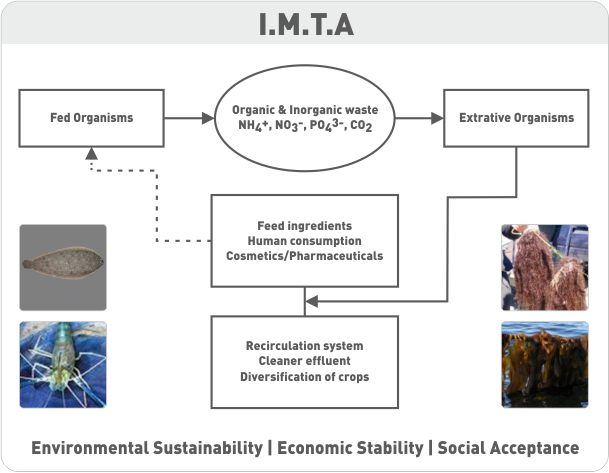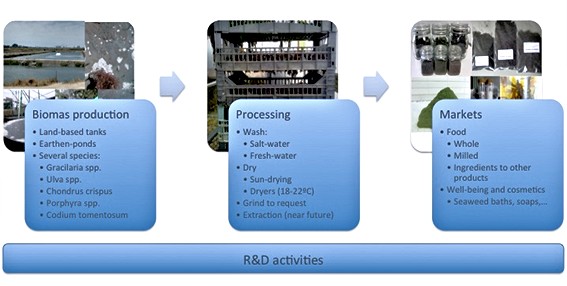Planning and operation
General info
Integrated multi-trophic aquaculture (IMTA)
Aquaculture has been, and still is, the activity in the animal production sector for human consumption, with the highest growth rate. However, the intensive animal production systems, more common in this industry, produce high quantities of nutrients (namely nitrates, ammonia and phosphates). With nutrient removal processes often non-existent, un-efficient or dissimulated, the release of these nutrients into the ecosystems can have severe environmental impacts, threatening the environmental sustainability of the industry and hampering its development.
IMTA systems are presented as a technology that can help to solve this problem (European Platform for the innovation and technology in aquaculture, 2011). These systems combine the production of fish or crustaceans with the production of extractive organisms (algae and/or bivalves), copying the natural functioning of marine ecosystems.
Besides constitute a tool for bio-remediation and environmental
sustainability, IMTA systems can contribute with added-value for the
animal aquaculture, through the creation of new products (algae
and/or bivalves). Simultaneously, the adoption of IMTA systems can
improve the consumers’ perception with respect to the industry
environmental impacts, and increase the value of the main product.
This scenario creates new opportunities for the development of the
macroalgae industry in Europe.

Production and Management
ALGAPLUS produces seaweed in 3 ways:
- High degree of quality control on the cultivation and processing of the biomass – Aiming at “small” quantities produced; High added value products.
- Minor manipulation of the cultivation conditions – Bigger scale of production;
- Harvest of non-domesticated species – or for low impact and small markets (no investment in culture justified)
ALGAPLUS expects to be producing some tons of wet seaweed per ha/year in 2015 (variable with species). The company also develops their own seaweed-derived products to the food and well-being market sectors. The seaweed production is developed year-round, subject to each species life-cycle. The production yield may vary seasonally.
ALGAPLUS has currently 4 full-time employees, all with university
education that assure the seaweed production, product development,
R&D and administrative activities. Whenever necessary, the daily
farming operations are carried out by the fish-farm employees, on a
part-time basis.

Photos & text extracted from: ALGAPLUS,
www.algaplus.pt